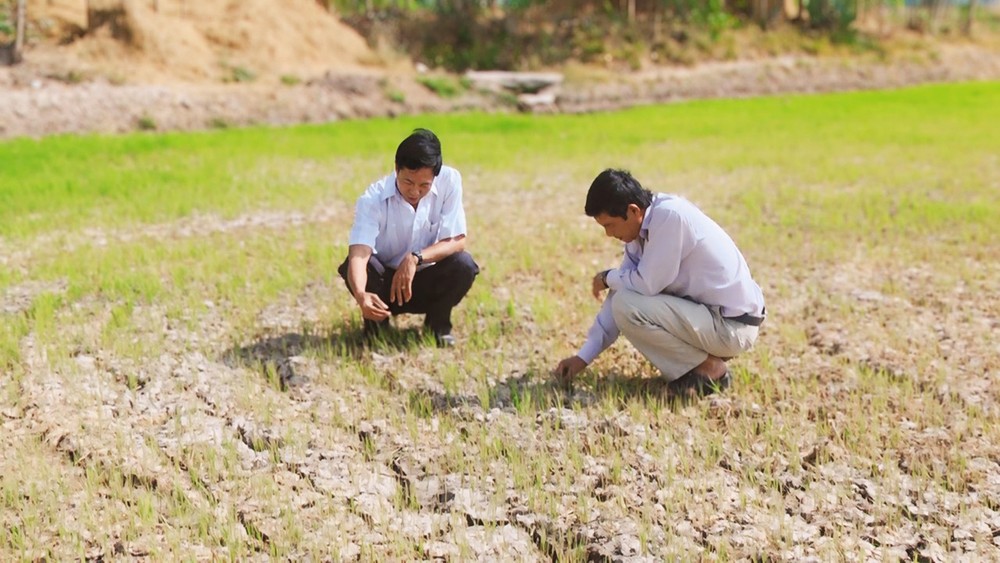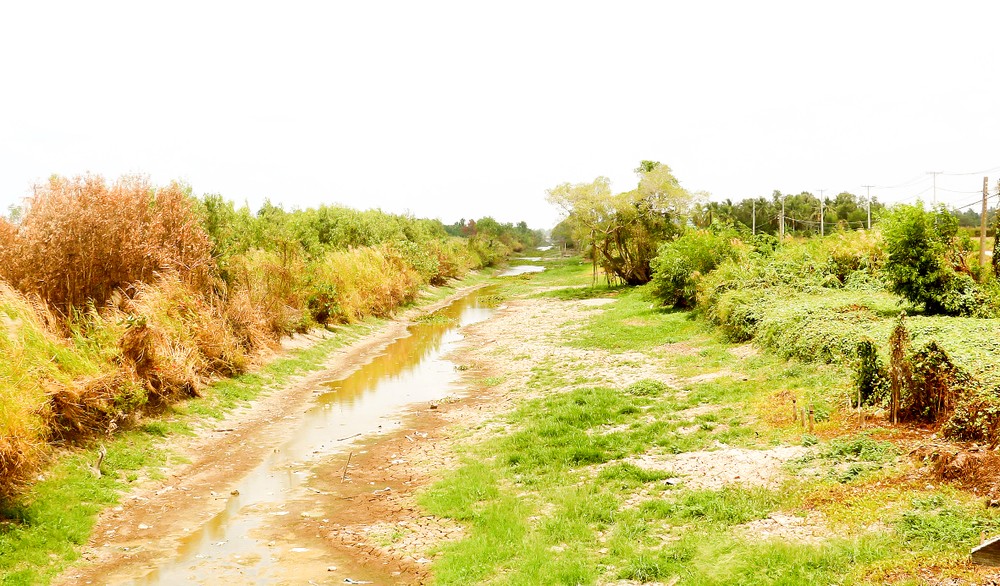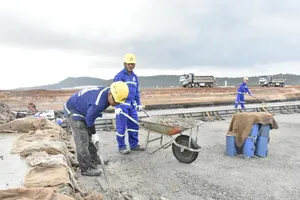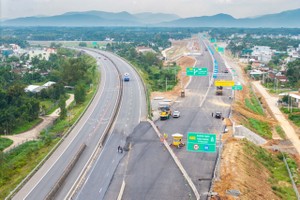
As of mid-March 2024, more than 40,000 hectares of production land lacking irrigation water, more than 200,000 households lacking fresh water for daily use, and nearly 400 cases of subsidence, and landslides in the Mekong Delta provinces due to drought.
Over the past 10 days, family members of resident Thach My in Tan Hung Commune in Soc Trang Province’s Long Phu District have been running off their feet buying pumps and digging temporary ditches to bring water from the last two stored freshwater ponds in the garden with the hope of saving 2 hectares of rice that has been sown for nearly 1.5 months.
However, the amount of water was not enough and the rice leaves began to burn. Mr. Thach My moaned that "man proposes, God disposes". Because the price of rice rose and farmers harvested the winter-spring crop of 2023-2024, peasant Thach My and many local farmers took advantage of sowing seeds for the third crop of rice to earn more income.
Although water has been stored in the pond for irrigation, it is not enough because this year the drought is longer and more intense than usual, and saltwater intrusion is deep. If it doesn’t rain next week, he will lose nearly VND35 million for hiring people, seeds, and fertilizer from the beginning of the season until now.
Next to Mr. Thach My's rice field, the rice fields of many other farmers are also withering, with burning tops, and dry stems. Some households have to cut young rice to feed cows and ducks. According to the Department of Agriculture and Rural Development of Soc Trang province, hundreds of farming households in Tan Hung Commune did not follow the agricultural sector’s recommendations, so they suffered heavy losses due to drought and salinity.

Director Huynh Ngoc Nha of the Department of Agriculture and Rural Development of Soc Trang Province said that from mid-2023, when experts and meteorologists warned of the impact of El Nino and the prolonged 2023-2024 dry season, the province's agricultural sector has coordinated with local authorities to advise farmers not to grow the third rice crop following the winter-spring crop and can switch to other crops to avoid saltwater intrusion. However, due to traditional production and rising rice prices, many farmers still sow seeds regardless of the agricultural sector’s warning.
According to statistics, of 6,000 hectares of rice in Long Phu District of Soc Trang Province were sown without careful planning, about 3,000 hectares are lacking water and 1,000 hectares are seriously lacking water which are at risk of dying. The local agricultural authority will try to save these paddy fields from salinity intrusion.
Nevertheless, it will be difficult to save, because salinity is encroaching deep into the field, said Mr. Huynh Ngoc Nha.
Thousands of farmers in Ca Mau are in despair as they are likely to suffer losses when their thousands of double-crop rice areas in the freshwater zone of Tran Van Thoi district have also been thirsting for fresh water for nearly 10 days. Meanwhile, farmers in Thoi Binh District following the local government’s recommendations have switched to the rice-shrimp model which can withstand brackish water.
Up to now, the entire rice-shrimp area is developing well, farmers harvest shrimp for high income. Currently, salt water is still creeping into ditches, canals, orchards and vegetable gardens in Hau Giang Province, causing farmers to struggle to cope.
Head of the Department of Agriculture and Rural Development of Long My District Le Hong Viet said that because shrimp breeders in the Go Quao - Kien Giang area bordering Long My District still use salt water to raise shrimp, salt water is intruding accordingly. The local administration is facing difficulties in controlling saltwater intrusion for a long time.
According to Mr. Le Hong Viet, it is time for localities to have specific production area plans based on the specific local characteristics to respond more effectively to drought and salinity during the dry season. Farmers in severe drought-prone districts must adapt various practices to cope with drought, said Mr. Viet.
According to Nguyen Huu Thien, an expert on the Mekong Delta ecology, this year's dry season tides have been higher than average for many years, pushing saltwater inland. At large river mouths, salinity prevention works (dykes) have been tightly closed, at this time the pressure of tidal water flows into large branches of the Mekong River, deeply penetrating canals and inland fields. This shows that dyke and embankments construction is not really effective in preventing salinity in coastal areas.
In the past two months, more than 500 households in Bien Bach Commune of Ca Mau Province’s Thoi Binh District have had to live in a severe water shortage. Ms. Le Thi Tim said that in this area people cannot drill wells, so they have had to store rainwater for use. This year, the drought is severe and in the middle of the dry season, people have used up all the water in their tanks and jars. Worried about not having water for daily use, many families came to the commune to ask for help, but the local administration still had no plan to support people. She complained that residents have to buy water from boats in other places for VND50,000-VND70,000 per cubic meter. Despite high prices of water, a few boats have carried water, Ms. Tim said.
Inhabitants in Go Cong Dong District of Tien Giang Province also have to struggle with a shortage of water for daily activities, they have to buy cans of fresh water for cooking, bathing and washing during the dry season. Mr. Duong Phung in Kieng Phuoc Commune was angry because the local government pledged to invest in water plants and bring water from other places in 2016 when the region was bracing for severe drought.
























